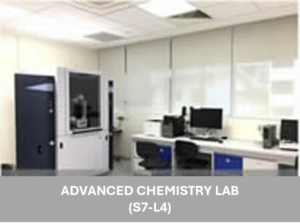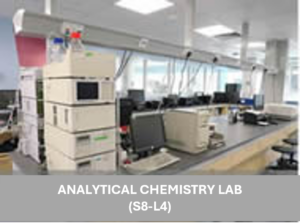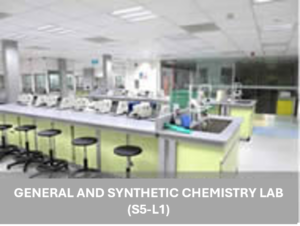Our undergraduate curriculum is designed especially for our students to gain in-depth knowledge in Chemistry and to equip them with skill sets in chemical experimentation. To that end, practical hands-on experiments are an integral part of our curriculum and account for about 25% of the chemistry major requirement. These practical training are conducted in our state-of-the-art teaching laboratories namely the Analytical Chemistry, General and Synthetic Chemistry, and Advanced Chemistry teaching laboratories. Our teaching laboratories are upgraded and modernized periodically to keep pace with the latest technological advances in chemical instrumentation. Our mission is to provide our students with the best training platforms so that they can acquire the necessary skills and experience as they embark on their careers after they graduate.



Here are some experiments that are carried out in the teaching laboratories:
Separation of Active Ingredients of Analgesic Tablets
Students are trained to acquire basic laboratory techniques to isolate three pharmaceutically important organics and to confirm their identities by using typical characterization tools such as thin-layer chromatography and melting point determination.
Determination of Fluoride Ion Concentration in Toothpaste Using an Ion Selective Electrode (ISE)
Students learn to use an electrode selective for the fluoride ion to determine fluoride content in a toothpaste. Various ISEs specific for almost any ions, provides rapid and inexpensive detection.
Synthesis and Characterizations of meso-Tetraphenylporphyrin and related Metal Complexes
Metalloporphyrin (MP) represents an important class of coordination complexes with interesting catalytic properties and biological relevance (i.e. haemoglobin in red blood cells). Selected complexes will be synthesized and characterized by common spectroscopic methods such as Mass Spectroscopy (MS), Ultraviolet- Fourier-transform infrared spectroscopy (UV-FTIR) and Nuclear Magnetic Resonance (NMR) etc.
Synthesis of Gold nanoparticles and study of their surface assembly
Students learn to synthesise gold nanoparticles which are has broad range of applications e.g. as sensory probes, electronic conductors, therapeutic agents, organic photovoltaics, drug delivery in biological and medical applications, etc. Students also have hands-on experience in using Transmission Electron Microscopy (TEM) for gold nanoparticles characterisation.